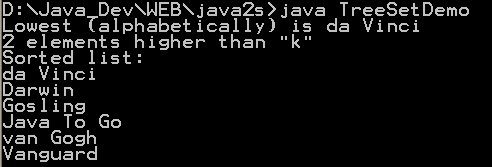Extend AbstractSet to Create Simple Set
/* SimpleSet Copyright (C) 1998-2002 Jochen Hoenicke.
*
* This program is free software; you can redistribute it and/or modify
* it under the terms of the GNU Lesser General Public License as published by
* the Free Software Foundation; either version 2, or (at your option)
* any later version.
*
* This program is distributed in the hope that it will be useful,
* but WITHOUT ANY WARRANTY; without even the implied warranty of
* MERCHANTABILITY or FITNESS FOR A PARTICULAR PURPOSE. See the
* GNU General Public License for more details.
*
* You should have received a copy of the GNU Lesser General Public License
* along with this program; see the file COPYING.LESSER. If not, write to
* the Free Software Foundation, 675 Mass Ave, Cambridge, MA 02139, USA.
*
* $Id: SimpleSet.java.in,v 1.1.2.1 2002/05/28 17:34:24 hoenicke Exp $
*/
import java.util.AbstractSet;
import java.util.Iterator;
public class SimpleSet extends AbstractSet implements Cloneable
{
Object[] elementObjects;
int count = 0;
public SimpleSet() {
this(2);
}
public SimpleSet(int initialSize) {
elementObjects = new Object[initialSize];
}
public int size() {
return count;
}
public boolean add(Object element) {
if (element == null)
throw new NullPointerException();
for (int i=0; i< count; i++) {
if (element.equals(elementObjects[i]))
return false;
}
if (count == elementObjects.length) {
Object[] newArray = new Object[(count+1)*3/2];
System.arraycopy(elementObjects,0,newArray,0,count);
elementObjects = newArray;
}
elementObjects[count++] = element;
return true;
}
public Object clone() {
try {
SimpleSet other = (SimpleSet) super.clone();
other.elementObjects = (Object[]) elementObjects.clone();
return other;
} catch (CloneNotSupportedException ex) {
}
}
public Iterator iterator() {
return new Iterator() {
int pos = 0;
public boolean hasNext() {
return pos < count;
}
public Object next() {
return elementObjects[pos++];
}
public void remove() {
if (pos < count)
System.arraycopy(elementObjects, pos,
elementObjects, pos-1, count - pos);
count--;
pos--;
}
};
}
}
Related examples in the same category
| 1. | Set, HashSet and TreeSet | | |
| 2. | Things you can do with Sets | |  |
| 3. | Set operations: union, intersection, difference, symmetric difference, is subset, is superset | | |
| 4. | Set implementation that use == instead of equals() | | |
| 5. | Set that compares object by identity rather than equality | | |
| 6. | Set union and intersection | | |
| 7. | Set with values iterated in insertion order. | | |
| 8. | Putting your own type in a Set | |  |
| 9. | Use set | |  |
| 10. | Another Set demo | | |
| 11. | Set subtraction | |  |
| 12. | Working with HashSet and TreeSet | |  |
| 13. | TreeSet Demo | |  |
| 14. | Show the union and intersection of two sets | | |
| 15. | Demonstrate the Set interface | | |
| 16. | Array Set extends AbstractSet | |  |
| 17. | Sync Test | | |
| 18. | Set Copy | | |
| 19. | Set and TreeSet | | |
| 20. | Tail | | |
| 21. | What you can do with a TreeSet | |  |
| 22. | Remove all elements from a set | | |
| 23. | Copy all the elements from set2 to set1 (set1 += set2), set1 becomes the union of set1 and set2 | | |
| 24. | Remove all the elements in set1 from set2 (set1 -= set2), set1 becomes the asymmetric difference of set1 and set2 | | |
| 25. | Get the intersection of set1 and set2, set1 becomes the intersection of set1 and set2 | | |
| 26. | Int Set | | |
| 27. | One Item Set | | |
| 28. | Small sets whose elements are known to be unique by construction | | |
| 29. | List Set implements Set | | |
| 30. | Converts a char array to a Set | | |
| 31. | Converts a string to a Set | | |
| 32. | Implements the Set interface, backed by a ConcurrentHashMap instance | | |
| 33. | An IdentitySet that uses reference-equality instead of object-equality | | |
| 34. | An implementation of the java.util.Stack based on an ArrayList instead of a Vector, so it is not synchronized to protect against multi-threaded access. | | |
| 35. | A thin wrapper around a List transforming it into a modifiable Set. | | |
| 36. | A thread-safe Set that manages canonical objects | | |
| 37. | This program uses a set to print all unique words in System.in | | |
| 38. | Indexed Set | | |
| 39. | An ObjectToSet provides a java.util.Map from arbitrary objects to objects of class java.util.Set. | | |
| 40. | Sorted Multi Set | | |
| 41. | Fixed Size Sorted Set | | |
| 42. | Set operations | | |
| 43. | A NumberedSet is a generic container of Objects where each element is identified by an integer id. | | |
| 44. | Set which counts the number of times a values are added to it. | | |
| 45. | Set which counts the number of times a values are added to it and assigns them a unique positive index. | | |
| 46. | Indexed Set | | |
| 47. | A set acts like array. | | |
| 48. | Implements a Bloom filter. Which, as you may not know, is a space-efficient structure for storing a set. | | |
| 49. | Implementation of disjoint-set data structure | | |
| 50. | Call it an unordered list or a multiset, this collection is defined by oxymorons | | |